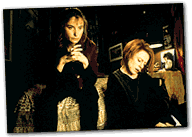WEEKEND
Scott Macaulay talks with Career Girls' Mike Leigh
 What does one do after one stops listening to the Cure? That question, in some small way, is at the heart of Mike Leigh's new film, Career Girls. A sort of melancholy, minimalist suite after the full-throated chamber opera that was his previous film, Secrets and Lies, Career Girls tells the story of two young women of 30 who get together one weekend in London to look back at a friendship fractured when they were housemates ten years earlier. And while Leigh's films are customarily virtuosic in their cross-cutting between different sets of characters' stories, Career Girls experiments more daringly with editing structure as it continually flashes backwards and forwards, using the passage of time to allow us to understand the film's heroines in ways we might otherwise be unable to.
What does one do after one stops listening to the Cure? That question, in some small way, is at the heart of Mike Leigh's new film, Career Girls. A sort of melancholy, minimalist suite after the full-throated chamber opera that was his previous film, Secrets and Lies, Career Girls tells the story of two young women of 30 who get together one weekend in London to look back at a friendship fractured when they were housemates ten years earlier. And while Leigh's films are customarily virtuosic in their cross-cutting between different sets of characters' stories, Career Girls experiments more daringly with editing structure as it continually flashes backwards and forwards, using the passage of time to allow us to understand the film's heroines in ways we might otherwise be unable to.
The film opens in the past, immediately banishing the feel-good vibe that concluded Secrets and Lies, with a closeup of Annie's skin condition--a scaly rash that runs up and down her cheek. Annie and Hannah share a flat, dress in black, listen to the Cure, and seem at odds with the world and each other. We cut forward and find Annie, sans rash and clad in gentle beige colors, travelling to London to visit Hannah, who now works as an executive in some sort of stationary company. But we quickly realize from both women's behavior, in which traces of their old insecurities remain, that while they may seem different, they're still trying to answer the same old questions.
Of Hannah's character, whose earlier hysterical aggression has mellowed into a biting, self-protective humor, Leigh says, "If you didn't see her in the present, you wouldn't understand how she behaved when she was 20. The way she's being a grown-up seems so different, but then you realize that she's dealing with the same affectations."
Leigh says the idea for Career Girls came out of his reflecting about the process he uses to make films. He's famous for developing his stories and screenplays with his actors, using a series of workshops and rehearsals to define both character and story.
"It's quite simple," Leigh says. "I've made lots of films where a great deal of time is spent with the past, but I've remained within conventional chronology. In the preparation for my films, we live through years of a character's development. A huge amount of preparation in the rehearsal period of Secrets and Lies [involved creating] years and years of family relationships. Normally, this function works retrospectively as 'experience'. In this film, I wanted to arrest those moments in the past and use them to motivate the action."
Still, while Leigh's process may be both unusual and enviable in this era of development hell--he's able to be greenlit before turning in a script--Leigh cautions that one shouldn't make too much of his working methods: "To be honest, the process is the same as all processes. Whether you sculpt or write, you have techniques. The key is not to be too distracted by the process. Obviously, I feel different things and say different things in my films. Like all creative people, you wind up with an interaction between the artist and the medium."
Leigh concluded filming Career Girls just days before he won the Palme d'Or in Cannes for Secrets and Lies. That film, a sort of family epic that reconciled class and racial divisions with emotion and humor, built large new audiences for Leigh in many countries, most notably France and the United States. Career Girls, which isn't as purposefully funny as Secrets and Lies, is a change of pace. Its bittersweet tone lies closer to earlier films like High Hopes; Leigh builds this narrative with counterpoint, avoiding the full-throttle resolution of his previous film. In fact, the emotional climax of Career Girls comes out of left field when a minor character makes a surprise reappearance in a quietly devastating tour de force.
"The challenge is to try as much as you can not to repeat yourself," says Leigh. "In that sense, each film is defined by its predecessors. With Career Girls, this was a much lower budget film and we had less time so it was going to be a tighter piece. But emotionally, its very much a part of my family of films. It's about remembering, getting on, and relationships."
There's a small, telling moment towards the end of the film: Anne and Hannah stop before a Cure poster advertising a new album and tour. Ten years later, the band plays on. Annie asks Hannah if she still buys their albums. No, Hannah replies. Offhand, Hannah admits she still does.
Leigh says, "They have a bit of money, they're independent, their lives are different, but it's a role they're playing--it's not what they're actually doing. They have become 'career girls'. [The title] is not about 'work' but the way [the women] are now playing it. The way people change and the ways they remain the same--the film, it's that really!"
VOD CALENDAR


 See the VOD Calendar →
See the VOD Calendar →


